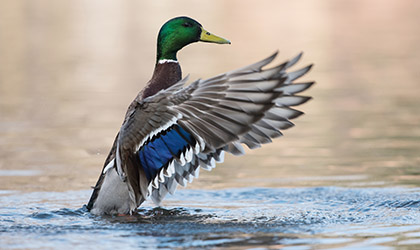Avian Influenza Update
From Dr Karl Jenning BVSc MRCVS

In response to a number of cases this winter in captive birds of prey, DEFRA arranged a meeting today to discuss Avian Influenza and the implications for falconers. Several interesting facts came out that I thought it was worth informing falconers of.
Firstly, there are a number of strains in circulation, which will likely vary year on year. The risk of transmission and virulence (how deadly) it is will vary from type to type - but equally, different bird species may be more or less susceptible.
Avian influenza may be circulating in the wildfowl population, and despite being highly transmissible, many wildfowl may not show any symptoms and continue to transmit the disease. Birds of prey appear to be highly sensitive, and the same disease that shows no signs in ducks, may be rapidly fatal in hawks and falcons.
The incubation period which is the time from eating an infected duck to death (which may be the first sign) can be as little as 24 hours. Any wild bird may carry the disease, and not necessarily be affected or show signs.
As such, whilst there is evidence avian influenza is in circulation, there will always remain a risk if you feed any wild bird. Freezing does not kill the virus – in fact there is evidence it may persist for 12 months and longer in frozen carcasses.
What does this mean for my falconry birds?
So the 'take home' message from this is that if you want to be safe please do not feed any wild bird that had been shot or hunted during the Autumn/Winter period - with wildfowl being of particularly high risk.There is risk whenever we fly our falcons and hawks in general; the risk of being shot, hitting a fence, being killed by another bird, being run over etc, which are probably higher risks than the chance of coming across Avian Influenza. However, the risk is not limited to one falcon or hawk. If you have several hawks, you also risk transmitting the disease to them, especially if your biosecurity isn’t as good as it should be.
In the larger picture, every outbreak, no matter how large or small, has significant implications on the ability of the whole country to export certain products and has wide reaching economic implications.
Further information on Avian Influence can be found here:
www.gov.uk/guidance/avian-influenza-bird-flu



